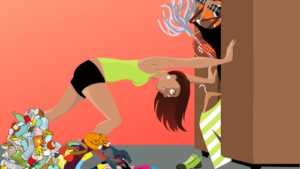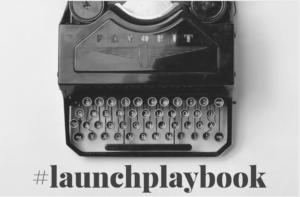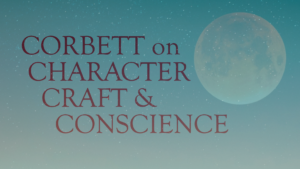Business
A few months ago, my younger daughter, then not-quite-sixteen, requested to drop out of high school.
A rising junior and easily in the top 2% of her class, she had learned from home since March of 2020. Unfortunately, Texas law required all students back in the classroom this fall, pandemic be damned. Despite the way she noticeably bristled each time we drove by the school building and the crying emoji drawn on the calendar square for August 17th, I thought she was resigned to returning.
I was wrong.
After considering every possible objection her father and I could have and preparing counterarguments for each point, she presented her case. With SAT and Texas Success Initiative exam scores qualifying her for college, we could not dispute that high school classes were academically pointless. She couldn’t care less about football rivalries, prom or walking the stage wearing purple and gold in 2023. Attending community college would allow her the flexibility to work, she reasoned, and work would force her to engage with people, something she did not do while surrounded by peers who seemed years younger than she felt. There were the financials to consider, too. Dallas County waives tuition for homeschoolers. That’s two years of free college.
Within a couple of weeks she had seamlessly morphed into a transitional adult with a license, car, Dallas College ID, and a barista job at one of our favorite coffee shops. Her confidence has grown as fast as her bank account.
Traditional schooling may be the most accepted path to getting an education, but there are alternate routes leading to the same destination. Students who are neurodivergent, quirky, have learning difficulties or, who, like my daughter, can’t be challenged in the era of No Child Left Behind, may thrive taking the scenic road alone rather than being funneled from point A to point B by way of crowded expressway.
Her transformation, and the vastly improved mental health that came with it, got me to pondering something in my own life. Why could I embrace her points about education without hesitation, yet I’ve spent decades of my life stuck on the traditional publishing on-ramp, refusing to acknowledge that it may be wiser to circumnavigate the gridlock than wait for it to clear? This stubbornness has persisted even when author friends who had been lucky enough to merge into traffic years ago now reported back that the road was riddled with vicious potholes and that unexpected lane closures often diverted traffic onto the shoulders.
“Sure, I’m on here,” they’d confide, “but only those driving Land Rovers are being invited past the construction right now. I’m in a Honda, so I’m parked, too.”
Read MoreIn an earlier post for WU, I wrote about the process of writing my audio-first novel for adults, A Hundred Words for Butterfly, and how it had differed from other novels I’ve written, because of the fact I specifically created it for the audio format. Well, this week the novel has been officially released by its publisher, Spineless Wonders Audio, and is available now for purchase on lots of different platforms, including Google Audio, Kobo, Nook, Libro, Authors Direct, and others. Audible will also follow shortly. It’s been an amazing and exciting process, seeing and hearing the audiobook take shape as narrator (Sarah Kennedy) sound engineer (Echidna Audio) cover designer (Bettina Kaiser) and producer (Spineless Wonders) worked on different aspects of the book. It’s an absolutely wonderful production, making my story, characters and setting come to warm and evocative life, and I hope listeners will enjoy it and take it to their hearts. (You can watch a lovely trailer for it, which features extracts from the narration, here). But today what I want to write about for this post is highlighting the absolutely brilliant marketing strategy that was devised by the Spineless Wonders team, in consultation with me, to create as much buzz as possible around the book in the lead up to its release. And I thought my observations might be of interest and inspiration to other authors, and not necessarily just in relation to audio novels.
In Australia, Spineless Wonders are known and highly respected for their innovative and dynamic approach to publishing, and their marketing strategy for all their books and events has always been focused on imaginative community engagement. And as we worked on our plan for the marketing of A Hundred Words for Butterfly, that engagement became more important than ever, because a large number of Australians, including but not only in our two biggest cities, Sydney and Melbourne, were (and still are) in lockdown due to an outbreak of the Delta strain of Covid19. (All of us working on it were in that boat). So it was even more crucial to come up with great ideas for activities that would offer people something fun, exciting and creative to do even when they were stuck in lockdown. After much discussion, we decided on three main themes/prongs for these.
First was writing, as represented by the #100words4butterfly writing competition, asking people to submit 100-word stories, poems, etc, inspired by four clever prompts linked to motifs in the book. (Prizes included a copy of the audiobook, plus entries published in a special digital magazine.) This comp was framed and run directly by the Spineless Wonders team and attracted lots of entries and great social media engagement, encouraged by striking marketing assets.
Second was a focus on the beautiful and fascinating Northern (or French) Basque country, which is the setting for most of the book. For this, I created intriguing blog posts and videos around what the Basque country, which is where my mother’s family comes from, means to me and my family. These were then shared on […]
Read More
The forthcoming launch of any book is a heavy lift, rife with news to announce, people to call, and updates to publicize.
But if you’re launching a debut? It’s an especially daunting endeavor because, well, you’ve never done this before! And the pressure is high: a splashy, big hit debut can make an author’s career. But conversely, a debut launch that doesn’t meet author or publisher expectations can be difficult to stomach, and this puts additional weight on second or third titles.
How is a debut author to know what, exactly, should be on his or her “task list” in the months approaching their big book launch? No doubt, authors publishing via the indie route will have more on their plate, but even traditionally-published authors are expected to take on much of the heavy lifting these days.
Below, I’ve pulled together a “playbook” for debut authors. Consider it a list of ideas for debut authors in the year leading up to their launch.
By all means, take this list with a grain of salt: there may be items on here that don’t apply to your specific circumstances or a suggested timeframe that needs to be reworked.
9-12 months until launch
6-9 months until launch
Read More
On December 1st, 2020, actor Elliot Page came out publicly as transgender. And on December 4, 2020, I became a published writer.
There’s a story here, of course, connecting the two. It begins with an excited Facebook post on my end about the Elliot Page news–practically a national holiday for the transmasculine community!– followed by a text from my good friend and fellow writer, Sara Shukla, asking if I might be interested in pitching a short piece about Elliot’s coming out to her editor at WBUR–Boston’s NPR News Station.
I’ll be honest– my initial reaction was “no, thank you.” Though I’ve wanted to be a published writer since I was a kid, my dream is novels, not articles. And besides, I’m not a trained journalist or someone particularly important. I’d always assumed that if I published any sort of personal essay or the like, it would be to accompany my novel’s eventual publication, or perhaps afterwards, when I had some credit to my name. Who would want to hear anything I had to say now?
But like all great ideas, once it was planted, I couldn’t get it out of my head. My “no thanks” quickly became a “well, maybe” and then an “okay, so I drafted a short piece.” With some encouragement and coaching from Sara, I sent it off, figuring that at the worst WBUR would pass, and at best they’d take it and I’d get my fifteen minutes of attention from friends on Facebook and Twitter.
It was of course the best case scenario. Better even. Not only was the piece accepted, polished, and published within three days, but it wasn’t just my friends who saw it. Nor did its impact end with my fifteen minutes of (minor) fame. My article was seen by not one but two people who then reached out and asked me to write for their websites. Writer Unboxed was one of those opportunities. And I only received that opportunity because one writing friend encouraged me to take a leap I wasn’t sure I was qualified for, and another re-shared my work on Twitter and vouched for me as a writer.
I don’t tell you this story to brag, but because my experiences in the past few months have taught me a lot. I haven’t given up on my novel or that particular dream, far from it. If anything, freelance writing has shown me that the years pursuing writing have not been in vain. If you’re anything like me, years spent working on a novel, or multiple novels, or multiple drafts of multiple novels, can leave success and completion feeling elusive, at best. Freelance writing has been a way to hone my craft, make connections in the writing world, get my name in print, and even make a small amount of money. It’s an opportunity I didn’t realize was an option, and now I’d like to share some of what I’ve learned with you, including the whys, the hows, and a couple of warnings.
Potential perks of freelance writing for novelists-in-progress:
Complete the circuit. Writing a book is long and hard and sometimes feels like a dark slog through a cold forest in […]
Read MoreWe’re honored to introduce you to today’s guest, author Catherine Adel West. Catherine’s powerful debut, SAVING RUBY KING, released just over a year ago and made an instant impact. TODAY, it was released as a paperback. It’s a multigenerational story about two friends–Layla and Ruby–and the lengths they’ll go to save their lives, their families and their friendship. Zakiya Harris, author of THE OTHER BLACK GIRL, calls Saving Ruby King is “a stunning force of a novel that has everything anyone could want in a family saga…”
We’re thrilled to learn that Catherine’s sophomore effort, BECOMING SARA KING, is in the works and will be released in 2022. More about Catherine from her bio:
Catherine was born and raised in Chicago, IL where she currently resides. She graduated with both her Bachelors and Masters of Science in Journalism from the University of Illinois – Urbana. Her work is published in Black Fox Literary Magazine, Five2One, Better than Starbucks, Doors Ajar, 805 Lit + Art, The Helix Magazine, Lunch Ticket and Gay Magazine. Catherine’s short story ORION’S STAR is featured in the forthcoming body positive anthology EVERY BODY SHINES (Bloomsbury, May 2021). In between writing and traveling, Catherine works as an editor.
Learn more about Catherine on her website, and catch her on Twitter or Instagram under the handle @cawest329.
Advocacy Is Not A Bad Word
My momma always told me, “Think before you speak.” I rarely applied this lesson when I was a kid. To me it somehow meant I wasn’t fully telling the truth, that there were little parts of me I couldn’t fully express. And my truth, as egotistical as I realize this belief is now, was the main one, the one that needed to be heard more than anything or anyone else.
Now out of my youth (somewhat), I realize my mom was teaching, or trying to teach me, about diplomacy; that there are various ways truth can be experienced and told. And my point can be made without razing the land, burning bridges, ignoring others’ feelings and thereby absolving myself of the consequences of my mouth and actions.
Nowhere have I learned this more than advocating for myself as a writer, as a black woman, as someone who’s always been desperate to be heard because the world does its absolute best to silence my voice.
Writing is the way I shout. I express. I fight. Writing is the way I try to advocate for my people, but I had a hard time properly advocating for myself.
When I got my first book deal, I was anchored to the idea of gratitude. So honored someone wanted my little ole book, I never stopped to think about what I wanted. How did I want the book to be represented? Marketed? How would it be edited? Could I trust someone else’s instincts to not sanitize the black experience but celebrate it? Could I trust myself to hold others accountable?
Was it wrong to ask myself these questions?
No. It wasn’t.
Making sure I knew what I wanted and getting what I wanted took time. It was my debut novel and something very close to my heart. And, after a lot of trepidation, […]
Read MoreOne learns a lot about one’s writing habits—and oneself—when cutting almost 19 percent of a manuscript, paring it from 119,000 words (476 pages) to 97,000 words (409 pages).
Mind you, this wasn’t a first draft—it had been reviewed twice by a Zoe Quinton, a developmental editor I very much respect and trust (and whom I interviewed here at Writer Unboxed). After our work together, she said:
“SO well done. I’m blown away by the amount of work you did, and how well you integrated all the pieces together to form a truly stunning, gripping whole. I loved every minute of it, and nearly cried at the end, even knowing what the basic setup would be. You’ve got a hell of a book here, one of the best I’ve ever worked on. Bravo.”
Once I began submitting to agents, however, with the exception of two agents I’ll discuss shortly, I either heard nothing back or got the seldom helpful, “Not for me, good luck with it elsewhere.” The two agents who provided some feedback said two very different but very helpful things. (It’s currently under submission with two other agents, one of who seems particularly receptive.)
The first of the two agents who provided notes complimented my writing but remarked that my use of a gay, bi-racial (Cambodian/African American) woman main character made the book virtually impossible to sell in today’s cultural environment given the #mystory movement.
The second agent, despite liking a great deal about the book, comparing it at one point to American Gods, felt a lack of “narrative urgency” in the writing.
In discussing all this with Zoe, she responded that my female character’s sexuality and race had raised no reds flags for her, and she is sensitive to such things. She also found comparing the book to American Gods then bemoaning a lack of narrative urgency puzzling, as Neil Gaiman’s novel is hardly a full-throttle page turner, but shares some of the philosophical, mythical, and historical texture of my book.
Let me be clear: I in no way fault Zoe for the extensive post-edit rewrite I ended up conducting. Her job was to read the book, note its shortfalls as she saw them, help me correct them, while at the same time being conscientious of what she saw as my voice, my style, and the type of book I seemed to want to be writing—a big, sprawling, dystopian journey covering a great deal of the American landscape with a mythical backdrop.
But given my respect for the two agents who gave me notes, I felt obliged to pay attention to what they were telling me.
Read More



















